Ethics and Economics: Adam Smith - Forgotten Freedom Fighters
In the chapter, Economics, in his book Freedom! Adam Kokesh says, “A voluntary society represents a free trade ideal in which all interactions are free of force and coercion. In that environment, all relations are voluntary and we choose to engage because we think we will personally benefit. In a voluntary society, the individual person is considered the ultimate means of production. We are happier and more prosperous because all of our interactions with others enrich our lives. Violence, coercion, and conflict are unproductive. Peace, self-ownership, and free trade are essential for any society to reach its potential.” To those of us who understand economics and value liberty, these words are self evident. These concepts have not always been known. What today we understand as a Free Market economy was suggested and made popular by a man named Adam Smith in two groundbreaking books, “The Theory of Moral Sentiments,” in 1759, and, “An Inquiry into the Nature and Causes of the Wealth of Nations,” in 1776. Within these works, he established what would influence the freedom of everyone on the planet. The idea that the freer an economy is, the more affluent the country, would become set into motion as one of the most liberating times in history.
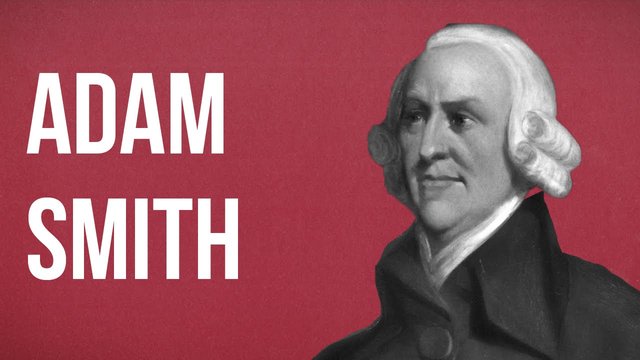
Within “The Theory of Moral Sentiments,” Smith investigates the prevailing opinions on morals and ethics of the time. Here is what he had to say about the trials of life, “The great source of both the misery and disorders of human life seems, to arise from over-rating the difference between one permanent situation and another...” Another good observation he made in this work is, “If there is any society among robbers and murderers, they must at least. . . .abstain from robbing and murdering one another. So beneficence is less essential than justice is to the existence of society; a lack of beneficence will make a society uncomfortable, but the prevalence of injustice will utterly destroy it.” Although this work is not considered the superior book, it is still valuable in understanding the character of Adam Smith. His moral compass certainly was moved by a want to find the ethical and freer way.
His latter work, “An Inquiry into the Nature and Causes of the Wealth of Nations”, more commonly known as, “Wealth of Nations,” is considered his masterpiece. It certainly is more influential. All free market economists draw the seeds of their ideas from Smith. The list of economists who are influenced by Smith reads as a “who’s who” of Libertarian thought; Ludwig von Mises, Friedrich Hayek, Murray Rothbard, and Milton Friedman are just the first few that come to mind.
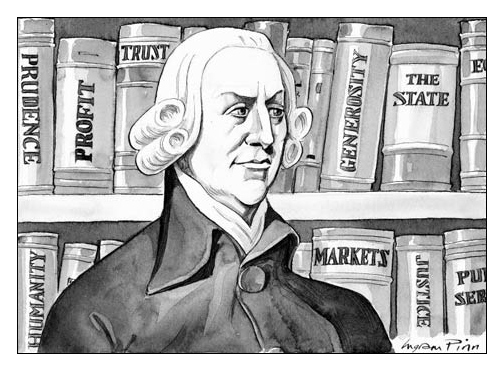
What does economics have to do with freedom? The answer, quite simply, is “everything”. Again, Adam Kokesh points this out, “When the principles of economics are applied only to things that can be valued in numbers, we miss out on their most important lessons. We tend to think of economics as ‘stuff having to do with money,’ but many exchanges of value occur without being counted in numbers at all. Every human interaction can be better understood as an economic exchange. We might think this cheapens interpersonal relations, but it actually elevates them.” If this is true, than if an economy is free, than it is more likely that the people will be as well.
These are the kinds of ideas that Adam Smith put together. He, initially, was not trying to be an economist. It was his goal to figure out a way for society to be more ethical. In studying how to create a moral society, he found that it had to first be economically free. Adam Smith put it this way, “In general, if any branch of trade, or any division of labour, be advantageous to the public, the freer and more general the competition, it will always be more so.”
Shortly after trying the theories that Adam Smith had suggested, Britain began to prosper. This caused many nations to move towards free trade as well. As people freed their economies, as predicted by Smith, the people became wealthier. As a result, they also drifted towards a more ethical life. The rise of Europe and America, as not only economic powerhouses, but also as generous givers, owes Adam Smith everything.
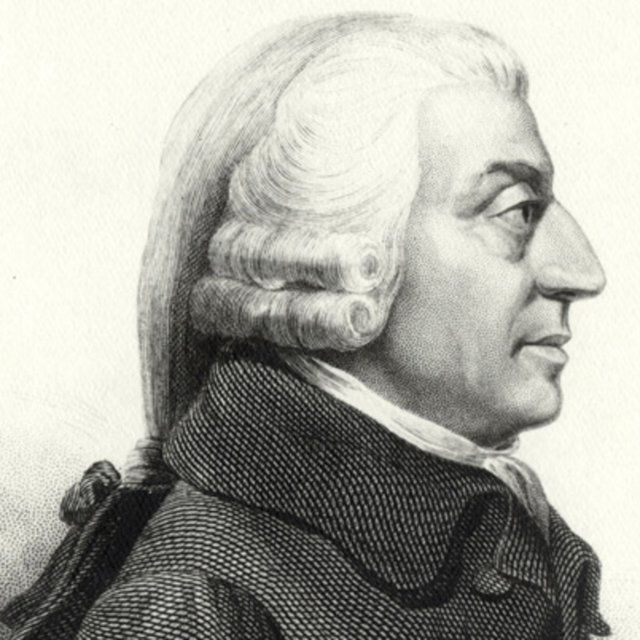
Today, we see the opposite of this trend. The world has cast aside most of the past successes and adopted government trade interference. It is true that the world is wealthier today than it ever has been, but that is to the credit of the free trade that existed. Our economy is lagging, and will continue to do so, as the government places more and more taxes, tariffs, regulations, and other controls on our ability to trade. Government has intentionally set up monopolies and chosen winners and losers because lobbyists paid off Washington. The market, when left alone, will correct itself; but the Federal Reserve has, again, manipulated the money supply which creates bubbles that must eventually burst. All of this, Adam Smith predicted.
Smith warned against empowering traders to collaborate as the government does today. “People of the same trade seldom meet together, even for the merriment and diversion, but the conversation ends in a conspiracy against the public, or in some contrivance to prices… But though the law cannot hinder people of the same trade from sometimes assembling together, it ought to do nothing to facilitate such assemblies, much less to render them necessary.” With central planning of any kind, we wind up with trade being stifled and this forces people to price fix, thus, larger companies push out smaller innovators. The free market stops all of this manipulation. If you can do it cheaper or faster, then you will obtain a market share, no matter your economic position.
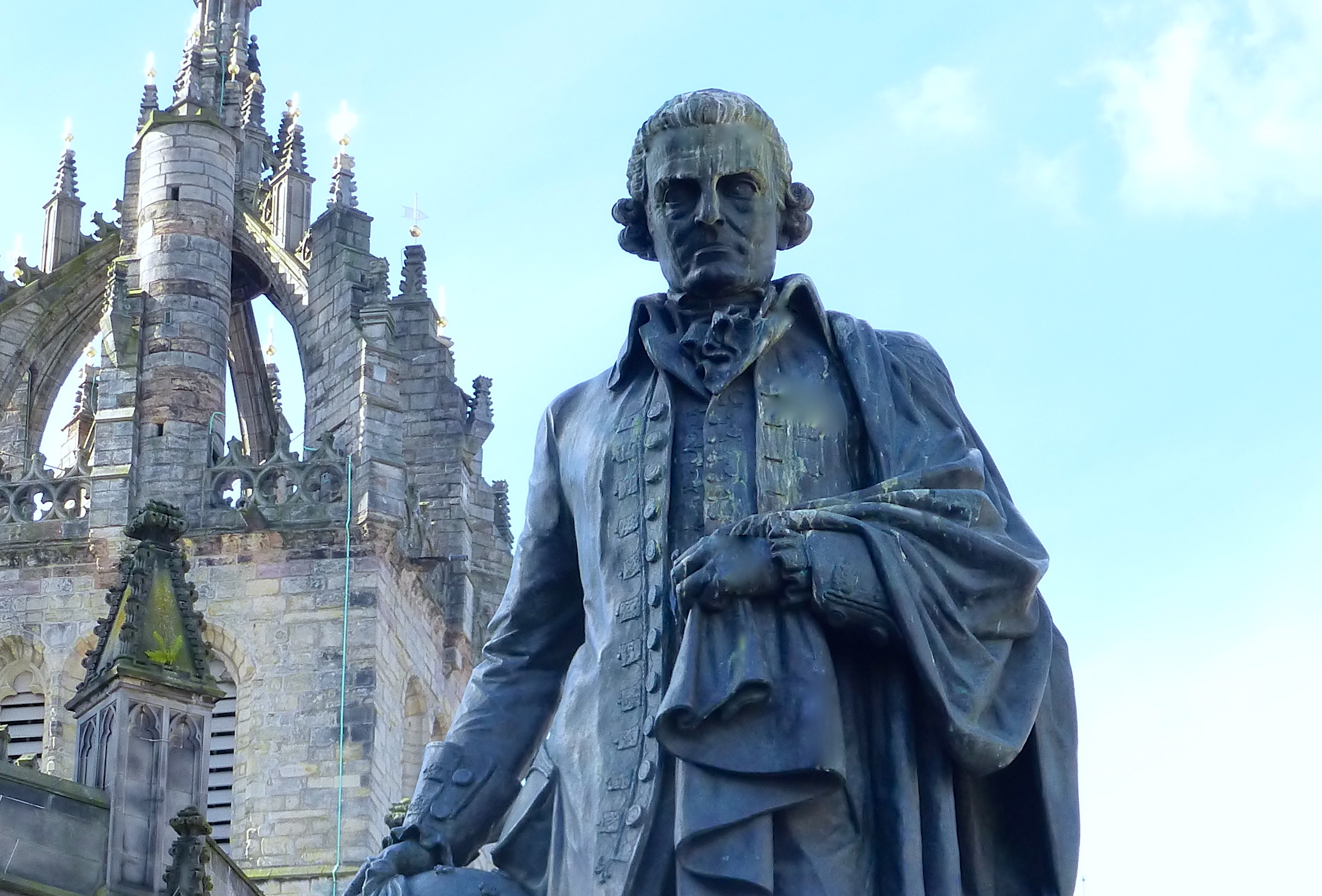
Smith believed in the nature of the market. He felt that any unfairness would work itself out based on economic laws. It was the “Invisible Hand,” of the natural process of trade which would direct the course of prices. Smith had a real sense of humanity. “It is not from the benevolence of the butcher, the brewer, or the baker that we expect our dinner, but from their regard to their own interest.” By coming together freely, we add value to each other and our products and services. The only controls that should be in place are whether the customers are willing, or not willing to buy. “The real and effectual discipline which is exercised over a workman is that of his customers. It is the fear of losing their employment which restrains his frauds and corrects his negligence.”
Smith understood that the work that we each do has value. “Labour was the first price, the original purchase - money that was paid for all things. It was not by gold or by silver, but by labour, that all wealth of the world was originally purchased.” The product of anyone’s labor cannot find a real value if the central planners decide to fund this or that project, and not another.
In Smith’s time, poverty was rampant. Solving this problem needed to happen before society could be ethical, or happy. It is more likely that people will steal, or even murder, if they see no hope for the future. Therefore, taking on the economy and doing everything we can to give each person a chance to succeed is the key to a prosperous people. Smith said, “No society can surely be flourishing and happy, of which the far greater part of the members are poor and miserable.” He also commented, “No complaint... is more common than that of a scarcity of money.” As the past couple hundred years has shown, and as Adam Smith predicted, the freer an economy is, the more money the people have, the happier those people will be.

Smith was not against government, but he’d figured out that the State is no different in its actions and consequences than an individual. “It is the maxim of every prudent master of a family, never to attempt to make at home what it will cost him more to make than buy… What is prudence in the conduct of every private family, can scarce be folly in that of a great kingdom.”
He also called for specialization of labor. Our world could not exist without it. Just in the building of one automobile, we can see that each part is made by a company which specializes in engines, windshields, tires, ect. Imagine how much more it would cost if each automobile company had to be able to build everything and employ people to put it all together. The costs, and sheer size of the factory needed to produce it all, would drive the price up so far that most people would not be able to afford vehicles. Add to that the fact that some companies are more skilled at making certain parts. The division of labor allows the price to be lower and the quality better.
What Smith taught us is that people are more productive when they make their own decisions as it relates to their own money. The individual should decide how much something is worth if he decides to sell. The customer also decides how much it is worth by figuring out how much he is willing to pay for the item. When the market decides, on its own, then everyone is happy. As government encroaches on the free exchange of goods and services, it takes away those choices. Why is it the government’s business to decide what we can buy or sell and to whom?
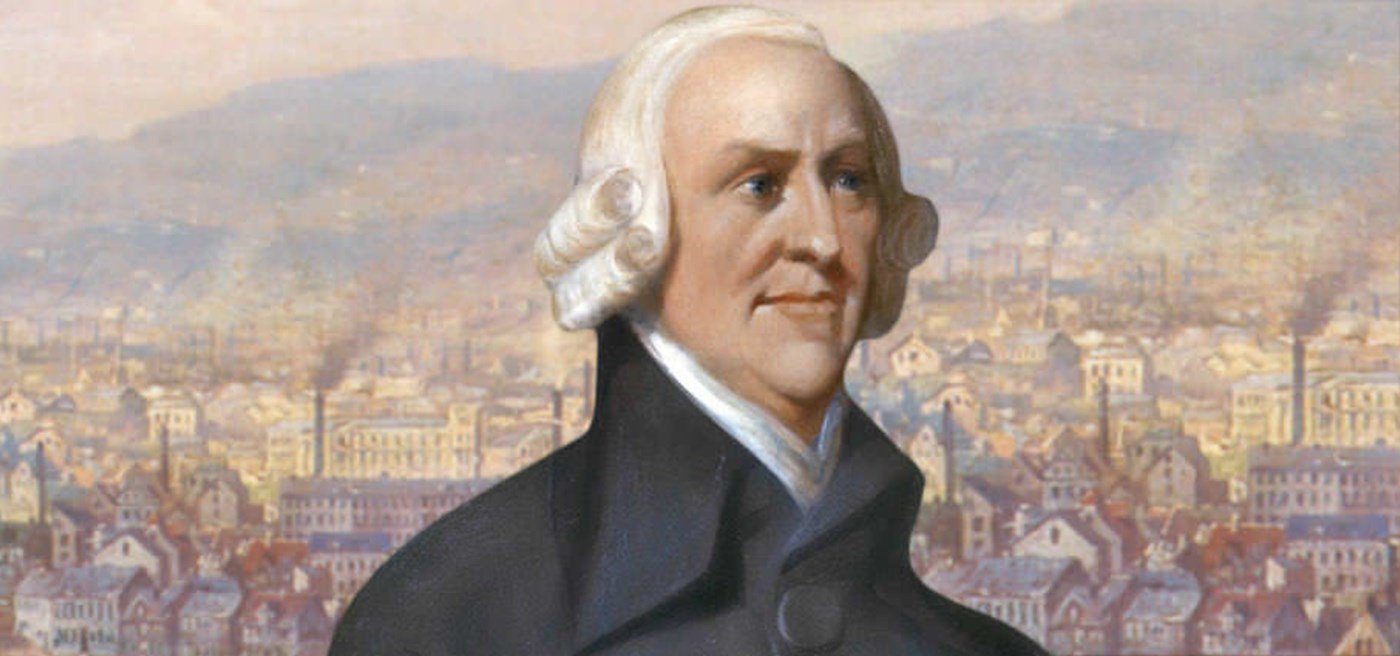
Those who love the State say that it is to protect us from charlatans and people who wish us harm. This is the same government who lies to us constantly, or has secrets, “for our own good.” That same government who is supposed to protect us, feeds medicines to us that have not been through any long term testing, and prohibits medicines, such as cannabis, which has not only proven to be effective, but has few negative side effects. Again, Adam Smith knew better. The free market is the only viable solution. If medicines are dangerous, the market will turn against them, and if someone is a cheating people, the people will respond either by word of mouth, or in the age of the internet, by blasting the company online.
You will notice that up until now, I have not used the word, “Capitalism.” That was intentional. The word capitalism was used by Karl Marx to indicate someone who worships money or capital. Those who support a free market do not worship money. They simply trust the market more than governments or mega corporations.
Marxist theories such as socialism and communism encourage the control of the economy by the government. Let’s compare those countries who, more or less, have adopted the economic models of each. The obvious examples for Smith are countries like, The United States, Britain, Australia, and even the socialist’s favorite Denmark, who recently has moved back to a free market model. Now, compare that with Soviet Russia, China before 2000, Venezuela, and even Brazil, with all of its recent corruption and economic woes.
In “The Politically Incorrect Guide to Socialism,” Kevin D, Williamson compares four post WW2 countries, China, India, Singapore, and Hong Kong. These countries chose two different paths. China was ravaged by the war, but India was not. Both of these countries chose the Socialist model of a government controlled economy. The outcome for both of these countries was a destruction of civil liberties and an economic death spiral.
The other two countries he compared, Hong Kong and Singapore. Both chose an economy largely based on free trade, and flourished. Hong Kong, like China, had been destroyed by the war. Unlike China, it is also almost without natural resources, so the cards were stacked against this small country. Yet, in 1998, it had the same per capita income as the wealthiest country in the world, The United States. Singapore, as well, has soared to heights that no one could have imagined; no one except Adam Smith. As Smith would have predicted, with free trade came a freer society and the protection of civil rights.

My first introduction to Adam Smith was through Milton Friedman. His conversations with Phil Donahue, a socialist and talk show pioneer, were hours of enlightening entertainment for my blossoming Libertarian mind. Just to be clear, I watched them for the first time on the internet. The show was on television when I was a small child. One of my favorite parts was when Donahue thought that he had Friedman with a quote from Smith. Donahue always tried to paint Friedman as uncaring, because he opposed government intervention. The quote was, “I have never known much good done by those who affected to trade for the public good.” As the talk show host sneered at the economist’s hero, Friedman smiled. He knew that Donahue had no idea of the meaning of the quote. The socialist had taken the quote to mean that it does no good to help others. Friedman masterfully explained Smith’s point. He said the most important word in that quote is “affected”. He explained that people who “affect,” or say that they are acting for the greater good, purport to act in the interest of society, but most of the time, are acting in self interest. In the often mentioned case of General Motors, he points to the motive of profit. The company “affected” to act for the greater good but as with most who seek to control the economy, they did so for personal interests.
Economics is not an exciting subject for most people. When you compare this freedom fighter to the direct actions of Geronimo, or the philosophical mind of Thomas Paine, Smith certainly falls short. It is not excitement that makes the warrior of freedom; it is their ability to set themselves or others free. It is no coincidence that many modern leaders, such as Ron Paul and Adam Kokesh, study economics. Without a free market giving needed stability, our fight would be much more difficult. People who worry about where their next meal is coming from seldom think too deeply. Liberty in economy simply equals freedom in life. As Adam Kokesh said, “it is all economics.” Those who seek to control the economy seek to control property. One of the most precious things you own is yourself. Remember, that when the government or anyone else tries to control or “manage” the economy.
By @marcus.pulis (Press Secretary)
Sources
“Freedom!” –Adam Kokesh
“An Inquiry into the Nature and Causes of the Wealth of Nations” –Adam Smith
“The Theory of Moral Sentiments” –Adam Smith
“The Politically Incorrect Guide to Socialism” -Kevin D. Williamson
https://tomwoods.com/ep-717-debunking-utopia-exposing-the-myth-of-nordic-socialism/
Interesting take on things. Smith is definitely a founding father on the subject and although I am not well versed on his writings, the people who have come after him, have influenced me substantially. Steven Levitt is prolly my favorite author and podcaster, I have read Freakonomics series and listen to his podcast religiously, he gives such great insight on the economics of everything.
You are right when you talk about every interaction being essentially an economic exchange. The only thing I think you are missing is that humans are irrational actors and their words usually differ from their actions. Humans act for two basic reasons; in pursuit of pleasure or avoidance of pain, I think we need to look into the latter aspect a lot more.
Great post Adam, enjoy reading your stuff, just wish you interacted a bit more.
Tip!
@adamkokesh this is an interesting take on things. Very well done.
Jefferson, Jackson, Smith... 3 of my favorite people of all time
I feel like Smith's Invisible Hand is one of those misquoted and misappropriated concepts that was put in a dead man's mouth to distort his original meaning.
I believe when Smith spoke of an invisible hand, he meant a secret society that intervened in society and markets to advance it's own agenda.
"An invisible hand" if you will, or an All Seeing Eye, or anything of that nature.
People then came to distort that original meaning and co-opted his use of the invisible hand analogy to mean the "forces of the free-market"
This is like a 180 degree inversion of what Smith was advocating. Because the very nature of "markets being guided by an invisible hand" aka secret society goes against everything Smith ever hoped for a society. He advocated for a free and open society, ridded of taboos and restrictions.
I read wealth of nations through and through and to me it would seem "free-market theorists" aka planned economy zealots love nit-picking his work to justify their crazy plots and narratives, muh like salafists, evangelicals and taldumists all disgrace the quran, bible and torah with their wilfull or ignorant interpretations of these works.
All great works are always appropriated and subverted to make sure society stays bounded and controlled.
Smith was truly an enlightened man, it's a shame his vision of a free, fair and open society was twisted into a blueprint for the most efficient system of exploitation and slavery in the world.
Capitalism and free-market was not supposed to turn into the system of soft-slavery it became, but that's because everybody thought that the "secret hand" was an impersonal force of nature.
Nope. It was the effect of a concentrated and focused attempt at conquering the world through division.
Shame. The ideas of smith are still good, they just need re-interpretation for the 21 first century to move forward.
We're kind of passed the stage of technological evolution that Smith was addressing, but his points about not dividing labor too much and becoming idiots who can barely do anything else than push buttons and pull levels (tapping and swiping screens in this day and age) holds truer today than it ever did.
Great poat about a very important historical character. Smith along with Rousseaux are some of the ones who best embodied The Enlightenment
Scottish economist, philosopher and author as well as a moral philosopher, a pioneer of political economy
great person
I remember when I was in college, adam smith became my first wife, I remember it so much when I forgot to bring the book, I was not allowed to go to class to study
Curated for #informationwar (by @wakeupnd)
Relevance: Sharing the truth.
To listen to the audio version of this article click on the play image.

Brought to you by @tts. If you find it useful please consider upvote this reply.
A great philosopher and economics a unique combination